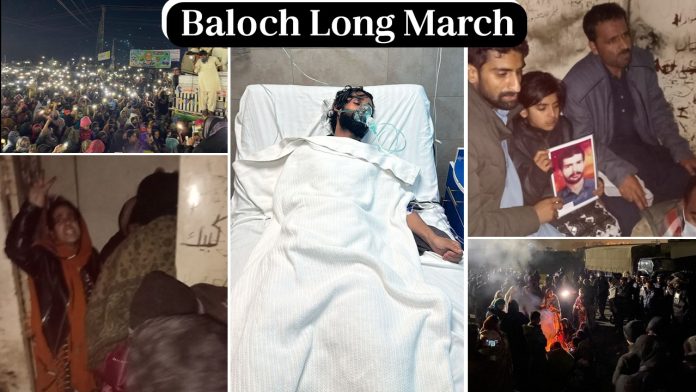On Wednesday night, the Islamabad police forcefully dispersed Baloch protesters participating in the long march against extrajudicial killings in Pak-occupied-Balochistan. The march, which had reached Islamabad on 21 Dec night, faced obstacles as the police obstructed their entry into the city, using various tactics to harass and intimidate the protesters. The march, led by prominent activist Mahrang Baloch, had covered nearly 1,600 k.m. before encountering obstacles in the capital. But, displaying courage and commitment, she stated, “Our movement will continue until our demands are met.”
Despite facing resistance from the police, the march decided to proceed to D Chowk from the National Press Club Islamabad. In response, the Pakistan Army deployed heavy police forces and water tanks, aiming to disrupt the peaceful protest. The situation escalated as the police resorted to violence, injuring several peaceful protesters through baton charges, tear gas shelling, and water cannons.
Islamabad police cracks down
Numerous protesters were arrested by the Islamabad police, who used force not only on the long marchers but also in front of the press club. The severity of the situation left many peaceful protesters seriously injured, with urgent medical attention needed. Efforts are underway to rescue and support those injured during the clashes.
Disturbingly, the Islamabad police arrested all participants of the Long March, including families, females, and even children, dismantling the camp and initiating violence against women and others present. The crackdown extended beyond Islamabad, as the police searched residences and flats of Baloch students and families throughout the city, brutalising against the Baloch community in the name of apprehending protesters through force and ruthlessness.
The arrested protesters are being shifted to different locations, raising concerns about their safety and well-being. The Baloch community condemns the brutal actions of the Army, and there is a global call for international condemnation of the Baloch genocide.
Baloch Yakjehti Committee
The march, sparked by the death of Balaach Mola Bakhsh in extrajudicial killing, calls for the release of missing persons, disarming of the Counter Terrorism Department (CTD), and accountability for Army’s abuses. Mahrang, whose father disappeared in 2009, emphasized the need for justice and transparency. Leaders of the march demand the release of disappeared individuals and the disarming of the Counter Terrorism Department (CTD) to prevent future abductions and fake encounters.
Mahrang Baloch, a prominent leader of the Baloch Yakjehti Committee organizing the march, emphasized that the movement will persist until their demands are met. Notably, this march is unique as it is led by women, reflecting the uncompromising stand of Baloch women in the face of harassment and disappearances of male activists.
The situation in Islamabad remains tense, with concerns about the whereabouts of detained protesters. The Baloch activists have urged human rights organizations and international media to highlight their cause and advocate for the immediate release of those arrested.
Peaceful protest in Quetta
In the backdrop of the brutal crackdown on peaceful protestors, the residents of Pak-occupied Balochistan have staged a roadblock on the primary route to the capital city, Quetta. This was a remarkable attempt to express unity and solidarity with the marchers, as they call for the prompt release of participants in the Baloch Long March in Islamabad. The community remains resolute, expressing that Pakistan has caused significant harm, and they will not tolerate further violence. The plea echoes the urgency to address the ongoing genocide, emphasizing the need for collective voices to break the silence surrounding this grave issue.
Justice for Balochistan
The Pakistan Army has a long history of denying involvement in enforced disappearances, even as evidence points towards them. The Commission of Inquiry on Enforced Disappearances has received over 9,000 cases since its inception, with the vast majority originating from Pak-occupied-Balochistan.
Bakhsh’s family, like countless others, has no faith in official inquiries. Mahrang, speaking on behalf of the marchers, demands the disarmament of the Counter Terrorism Department and a guarantee of due process for all. The protesters’ call for justice extends beyond Bakhsh’s case; they seek an end to the cycle of violence and impunity that has plagued Pak-occupied-Balochistan for decades.
The crackdown on the Long March highlights the Army attempt to suppress dissent and silence Baloch voices. However, the unwavering determination of the activists and the growing support from within Balochistan and beyond indicate that the struggle for justice will not be easily silenced.

